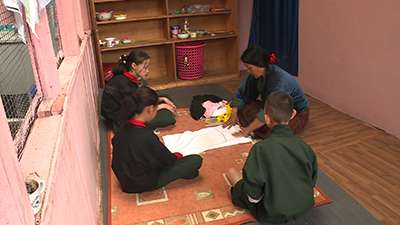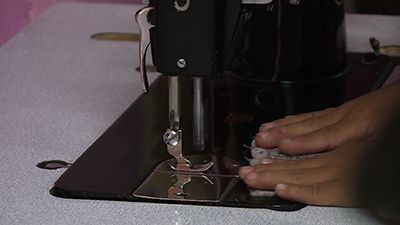 Children with disabilities tend to stay at home throughout their lives and they miss out on learning any life-skills in most cases leading them to depend on others for a living. All of these children living with disabilities could live lives on their own if parents and teachers are aware of transitioning planning.
Children with disabilities tend to stay at home throughout their lives and they miss out on learning any life-skills in most cases leading them to depend on others for a living. All of these children living with disabilities could live lives on their own if parents and teachers are aware of transitioning planning.
In transitioning planning parents and teachers prepare children living with disabilities for a productive adulthood. They plan and help children transition through various phases of life.
Karma Sonam Dorji has a child who has some form of disability but she is aware of transition planning. She shared how a lack of awareness about transition planning can hamper a child’s development. When you are not aware or do not have a transition plan for your child you tend to look at the disabilities and you ignore on identifying or developing your child’s skills.
“We as parents when we have a child with a disability the first thing we realize is what our child cannot do. We never look at the child’s abilities, what can our children do. This is where we need to change our mindset and work with our children on the areas that they are good at, where they have the strengths,” said Karma Sonam Dorji, a Parents’ Support Group.
Transitioning planning both at home and at school has helped her child develop over the years.
“Now he knows that we all work with a schedule or a rule set and we have to work along with that. Before he didn’t have any peers to play with, to socialize, or what it means to be socializing, what it means to play with his own age groups, what it means to learn, the knowledge he gains and I think with the transition planning from our side, from the parent’s side as well as from the school in terms of building the capacity and equipping the schools with tools to cater to our children’s needs, it has really helped my child,” she added.
Hejo Day Care in Thimphu, an inclusive center, practices transition planning. The center caters to around 100 children of which eight have some form of disabilities.
The center works closely with parents to help transition children with disabilities for primary schools.
“So this is what we do with children who come into our ECCD especially for children with learning disabilities or what this documentation does is it helps parents and the center focus on specific goals that we need to work on for the children for a specific amount of time. So the goals are thought out by the parents and the center together. We map it out together and then we work on them for four months and then after that the goal is revised and then we work on the next transition plan. Everybody has the same plan but is very important that children with disabilities have this plan so that they can go onto the next stage of learning,” said Yangree, the Proprietor of Hejo ECCD Center.
 Similarly, Changangkha middle secondary school in Thimphu caters to children with disabilities. The center identifies children’s capabilities and disabilities and puts them into various classes; the physically challenged without cognitive disabilities are put together in the mainstream classes while those who are cognitively challenged are taught various life-skills depending on their ability to learn. The school has four pre-vocational clubs to transition children with disabilities to other institutions once they attain the age of 16.
Similarly, Changangkha middle secondary school in Thimphu caters to children with disabilities. The center identifies children’s capabilities and disabilities and puts them into various classes; the physically challenged without cognitive disabilities are put together in the mainstream classes while those who are cognitively challenged are taught various life-skills depending on their ability to learn. The school has four pre-vocational clubs to transition children with disabilities to other institutions once they attain the age of 16.
“When we are talking about the transition that is for the mild to moderate children who can actually go for the transition. One day, ten years from now or 30 years from now we have to think of where will these children go? who will take care of these children when their parents are not there? So we need to make a life for these children. That is why the transition is important for these children because they have to live their lives one day by their own,” said Nyendo, the Principal of Changangkha MSS.
19 students went on transition to Draktsho Vocational Training Center in Thimphu from Changangkha middle secondary school between 2013 to 2016. Today the school has eight teachers catering to more than 60 children with various form of disabilities.
Bhutan Foundation is helping parents and teachers build and implement a transition plan for children with disabilities. The Foundation also supported two special education experts to work with parents, children and staff of Hejo ECCD center and Ability Bhutan Society in August last year. The special education experts helped parents understand the roles they can play in preparing their children for daycare or primary schools.
 “It allows a parent to envision the child beyond the current stage, it allows the parent to actually plan like what would be my child in the next five or 10 or 20 years. How would my child be productive? In what ways would my child give back to society? So that’s why we encourage parents to have a transition plan for their child so that the child can be more productive and have a meaningful life,” Sonam Yangden Tobgyel, a Sr. Programme Officer at Bhutan Foundation, said.
“It allows a parent to envision the child beyond the current stage, it allows the parent to actually plan like what would be my child in the next five or 10 or 20 years. How would my child be productive? In what ways would my child give back to society? So that’s why we encourage parents to have a transition plan for their child so that the child can be more productive and have a meaningful life,” Sonam Yangden Tobgyel, a Sr. Programme Officer at Bhutan Foundation, said.
Special education experts recommend that parents of children with disabilities should think about transition or planning for adulthood as early as possible. 16 is considered formal transition age for youth where they should have their plans, goals and dreams identified as per their interest and needs.








